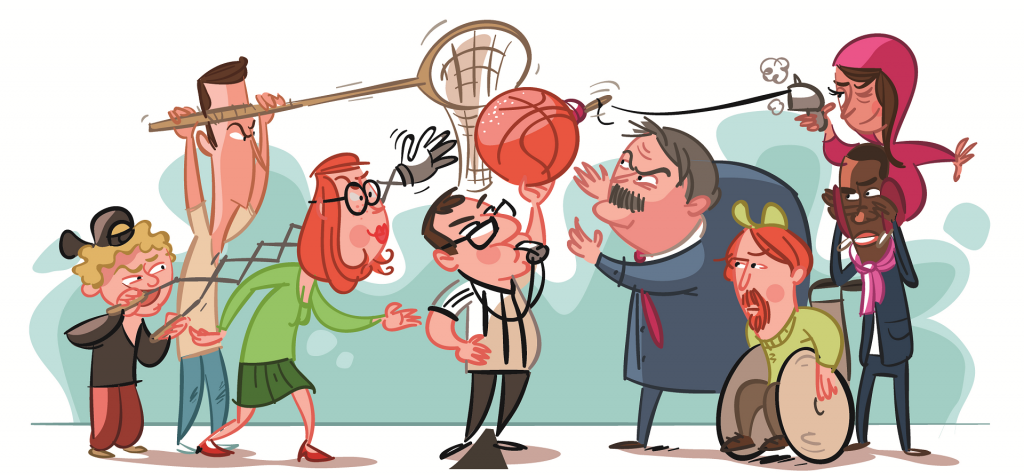Affirmative & Negative
By David Schimke
Want to improve public discourse? Be a good sport.
Author Amy Chua, best known for Battle Hymn of the Tiger Mother, has once again managed to tap into an emerging national conversation.
“At different times in the past,” the Yale law professor writes in her fifth book, Political Tribes: Group Instinct and the Fate of Nations, “both the American Left and the American Right have stood for group-transcending values. Neither does today.
“The Left believes that right-wing tribalism—bigotry, racism—is tearing the country apart. The Right believes that left-wing tribalism—identity politics, political correctness —is tearing the country apart. They are both right.”
Well before the 2016 presidential election, writers with a variety of ideological allegiances, including the National Review’s Ben Shapiro and the Atlantic’s James Fallows, began mourning the deep division and increasing insularity that has made it nearly impossible to proactively address social, environmental, and economic concerns. And, like Chua, they dependably betray their biases in the process of unpacking the problem. Fallows’s ilk blames Trumpism. Shapiro’s readership blames Obama. Chua, a slightly left-of-center provocateur, ultimately concentrates on the emergence of “identity politics” among cosmopolitan “elites.”
This tendency to simultaneously bemoan the rise of domestic factionalism and rush to lay the blame on a particular side is both ironic and dubious. It’s also typical. Columnists and commentators have constituencies that can sometimes be gently challenged, but given today’s fractured media environment—which is either a symptom or cause of our circumstance, depending on one’s point of view—it’s rare to find a pundit willing to hold a mirror up to their devotees.
Semantics aside, there’s clearly an emerging consensus that the phenomenon Chua and others are exploring is at the nation’s front door and threatening to blow the house (and senate, and presidency, and civic institutions) down. It would be useful to find a way to discuss the situation in a fashion that demands a bit more self-reflection and common cause. Or, more simply put, we need to take a breath and de-politicize our predicament.
In that spirit, consider one of the few things that have managed to help millions of people of different races, religions, and social persuasions survive an untold number of awkward silences and unavoidable, potentially incendiary work parties, weddings, and holidays with the in-laws.
Sports talk.
Fandom is foreign to many. For others, though, it’s a precious, precarious thing.
At its best, deep affinity for a team can build community, bind family, and foster healthy allegiance to a city, state, or educational institution. It can be exhilarating or exhausting, beautiful or grotesque, earthbound or otherworldly. Best of all, it allows for intense passion that alternately exhibits itself in fleeting bouts of unfettered joy and bittersweet heartbreak.
Often, it’s also inherited. Fathers and daughters, mothers and sons, brothers and sisters grow up cheering for the Vikings or Bears, Hawkeyes or Badgers. Team colors get in the blood and rouse spirited loyalty. It’s possible to break these ties, of course, but it rarely comes easy.
This sort of affinity can and too often does morph into blind allegiance and irrational zealotry. Which is one reason many people avoid balls and bats in favor of other pursuits. Since the 1800s, the specter of hooliganism has loomed over the sport of soccer. Street riots routinely mar significant sports victories. And fan-on-fan violence can ignite with or without the aid of alcohol. In these unfortunate cases, people’s self-esteem and self-worth are so closely aligned with a team that they lose sight of the sport itself. Respect for something greater, if it ever existed, is replaced by self-destructive, self-serving delusions of grandeur or victimhood or both.
In the last decade, our politics have begun to resemble this brand of unhinged fandom. Too many of us have allowed loyalty to a party or a personality to become more important than democracy itself, which was not designed to be a zero sum game, but a collective competition for the best way forward.
Too many of us have allowed loyalty to a party or a personality to become more important than democracy itself, which was not designed to be a zero sum game.
When it’s all done, no one wins and the field of play is rendered unrecognizable. We assume the worst of our foes: They must be corrupt or morally deficient. Un-American. Unpatriotic. Unfeeling. Unintelligent. Irredeemable.
Comparing politics to sports isn’t wholly satisfying. The similarities are well trodden and the differences in overall importance, vast. But as an exercise in understanding the nature of our nation’s discontent it seems as good a starting place as any—if only because it’s easier to see the absurdity of groupthink and faceless factionalism when it’s distinguished by a team logo, as opposed to a nation’s flag or some other sectarian slogan.
Fandom also seems a flimsier conceit, destructive when people begin to take their fight songs literally, but somehow less daunting and unbeatable. Maybe that’s because the word tribal dates back centuries, and, fairly or not, connotes a violent permanence. Or maybe, as anthropologist Lawrence Rosen argues, the fact that a growing number of commentators mistakenly view “tribes as primitive, violent, and insular is already having pernicious effects on our response to this new era of politics.”
“Tribes are our common human heritage. But that doesn’t mean they are some sort of primal, inescapable curse,” he writes in the January 16 issue of Foreign Policy, which Chua might want to peruse before her next book reading. “Tribalism is a social resource that human beings ought to, and do, make use of depending on the circumstances we face.
“Years of empirical studies of actual tribes show that even as they are defined by relatively narrow identities, they are also characterized by porous boundaries . . . As tribesmen may have learned through long experience, it is only by reaching across boundary lines that one may reconstruct a world that seems whole.”
Throughout history the incremental struggle for a more positive, productive politics has been marked by personal courage and demanded that individuals resist the allure of acquiescence. Since the last election, a growing number of people have proudly hardened their positions and blithely dismiss compromise and calm conversation as signs of weakness or a naive waste of breath. This is no more rational or productive than burning another team’s jersey.
It takes courage and imagination to consider another person’s—or, yes, even an entire political party’s—point of view. And, no, really listening and assuming another’s best intentions will not have us singing “Kumbaya” by the midterms. It might just catch on, though, and remind a few more people that sometimes great rivals can bring out the best in one another, shake hands when the whistle blows, and look forward to playing another day.

Twin Cities based writer, editor, and media strategist DAVID SCHIMKE is the founding editor of Citizens League Voice. [email protected]

